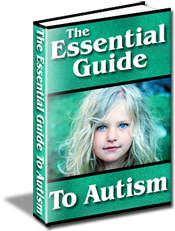Autism: Symptoms, Treatment And Coping
Click Here To Know The Simple Methods To Effectively Spot The 31 Signs of Autism
There is an estimation of three to six of very 1,000 children have autism. Autism is a brain disorder associated with developmental problems mainly in communication and social interaction. The disorder affects boys more often than girls. Signs of this disorder usually appear before age 3.
Diagnosis and treatment has greatly improved in the past few decades, however, autism cannot be cured. It persists throughout life. The recent increase in the number of autism cases in the United States may be more the result of improved diagnosis and changes in diagnostic criteria.
Severity of symptoms is different in each case. Some children are able to grow up and live independently, while others may always need supportive living and working environments. Early, intensive treatment can make a difference.
Signs and symptoms of autism include:
?Fails to respond to his or her name
?Has poor eye contact
?Appears not to hear you at times
?Resists cuddling and holding
?Appears unaware of others? feelings
?Seems to prefer playing alone - - retreats into his or her ?own world?
?Starts talking later than other children
?Loses previously acquired ability to say words or sentences
?Does not make eye contact when making requests
?Speaks with an abnormal tone or rhythm ? may use a singsong voice or robot-like speech
?Can?t start a conversation or keep one going
?May repeat words or phrases verbatim, but does not understand how to use them
?Performs repetitive movements like rocking, spinning or hand-flapping
?Develops specific routines or rituals
?Becomes disturbed at the slightest change in routines or rituals
?Moves constantly
?May be fascinated by parts of an object, such as the spinning wheels of a toy car
?May be unusually sensitive to light, sound and touch
Some children with autism become more engaged with others as they mature. They may show less marked disturbances in behavior. Those with the least severe impairments may eventually lead normal or near-normal lives. Others continue to have severe impairments in language or social skills. The adolescent years may mean a worsening of behavior problems.
The majority of children with autism are slow to acquire new knowledge or skills. However, there is an extremely small number of children with autism who have exceptional skills in a specific are such as art or math.
There is no identifiable cause for autism. Researchers believe the disorder is related to abnormalities in several regions of the brain. Researchers have also identified a number of gene defects associated with autism.
Extensive studies have shown no link between vaccines, particularly the measles-mumps-rubella vaccine and other vaccines containing thimerosal and autism.
When should you seek medical advice? Many babies do not follow the exact timelines found in some parenting books. Children with autism usually show some signs of delayed development by 18 months. The earlier treatment begins the more effective it will be.
If your baby falls into any of the following categories you should check with your doctor about further evaluation:
?Baby does not babble or coo by 12 months of age
?Baby does not point or wave or perform similar gestures by the age of 12 months
?Baby does not say single words by 16 months
?Baby does not use two-word phrases by 24 months
?Baby loses previously acquired language or social skills at any age
Making a diagnosis is difficult because the severity and manifestations of autism varies widely from child to child. There is no medical test to diagnose autism. A formal evaluation may consist of observing the child and talking to you about how the child?s social skills, language skills and behavior have developed and changed over time. Your child may need to undergo a number of developmental tests covering speech, language and psychological issues.
Signs of autism may appear by 18 months of age; however, the diagnosis of autism may not be made until age 2 or 3 when there are more obvious delays in language development. Early diagnosis is important because early intervention, preferably before age 3, seems to be associated with the best chance for significant improvement.
Treatment for autism includes:
?Behavioral and communication therapies
?Drug therapies: Right now there are no medications that directly improve the signs of autism. Some medications can help control the symptoms of hyperactivity, repetitive and aggressive behaviors.
?Complementary approaches: Art therapy, music therapy, special diets, vitamin and mineral supplements and sensory integration that focus on reducing a child?s hypersensitivity to touch or sound. There is no specific proof these therapies work. Always discuss with your child?s doctor before trying any of the complementary approaches.
Children with autism do not outgrow the disorder. They often respond well to highly structured education programs. A child with autism can learn to function within the confines of the disorder especially if treatment begins early.
Review the following tips to help you cope with raising a child who has autism:
?Find a team of trusted professionals
?Take time for yourself and other family members
?Seek out other families of autistic children
?Learn about the disorder
Source: Mayo Clinic
Disclaimer: This article is for educational purposes only. It is not intended to be a substitute for informed medical advice or care. You should not use the information in this article to diagnose or treat any health problems or illnesses without consulting your pediatrician or family doctor. Please consult a doctor with any questions or concerns you might have regarding your or your child?s condition.
This article is FREE to publish with the resource box.
Written by: Connie Limon. Visit us at http://www.about-autism.info for more information about autism.
Labels: animal_animal_autism_behavior_decode_in_mystery_translation_using, autism_childhood_rating_scale, autism_christian_contend_good_mistaken_parent_too_too_unkind_wise, autism_ontario

